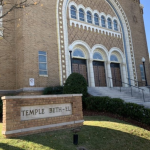By Sym Posey
The Birmingham Times
Temple Beth El on Thursday officially opened its Beth El Civil Rights Experience (CRE) with the screening of a short film, a panel discussion, a sampling of exhibits from its permanent on-site experience “In Solidarity” and the first opportunity to book group tours.
CRE explores Birmingham’s Civil Rights history through the lens of the Jewish community and builds connections to foster ongoing acts of tikkun olam (repairing the world).
“Our goal has never been to rewrite the excellent Civil Rights histories that already exist in our city,” said Melissa Young, project historian. “The idea is to search for meaning and healing in those events … to add a different lens to explore the Jewish community’s role in this vital piece of our city’s legacy. To foster dialogue and ongoing acts of tikkun olam.”
Beginning in the summer of 2020, leaders within the synagogue submitted a proposal for a program that with ties between Birmingham’s Jewish and Civil Rights histories. “It was to be used as a framework for out of state and local visitors who were already interested in the temple’s – and the city’s complicated pasts,“ Young said.
With the support and input of many throughout the community the project began to take a life of its own, said Margaret Norman, director of programming and engagement at Temple Beth El.
“Three years later, it is beyond what either of us, [me and Margaret] could have imagined at the time. It has truly become a community effort,” said Young.
As part of the buildout of the Civil Rights Experience, a robust library with more than 2,000 books donated by the estate of Rabbi Abraham J. Mesch [sjlmag.com] will form the core of a library and study space for research, study and education in the future. Rabbi Mesch was the temple’s Rabbi during much of the Civil Rights era, from 1935-1962.
Temple Beth-El was established in Birmingham in 1907 and has worshipped on Highland Avenue since 1926. A historic marker outside the temple memorializes a 1958 event when an unexploded bomb was discovered targeting the sanctuary.
During the 1950s and 60s, there was a period of upheaval in Birmingham as protesters and police often clashed in the streets during the Civil Rights movement. Around the same time, Birmingham was becoming notorious for bombings, earning the nickname, “Bombingham”.
On April 28, 1958, 54 sticks of dynamite were placed outside of Temple Beth El in what many believe was an attempt to bomb the synagogue, however, due to heavy rainfall, the burning fuses did not ignite. Last July, Temple Beth El dedicated a Civil Rights historic maker to commemorate the failed bomb attempt.
Although the case was never solved, many believe the planned bombing was an act of retaliation for Jewish involvement in the Civil Rights movement. Jews in the South experienced sting of discrimination and attacks from the Ku Klux Klan.
Currently, Temple Beth El welcomes visiting groups by appointment. The 60–90-minute program exposes visitors to the historic synagogue and the intersection of Birmingham’s Jewish and Civil Rights histories. The interactive program offers participants an opportunity not only to learn, but to engage and reflect. The docent-led tour includes a film, audio storytelling and an interactive activity recommended for both adults and youth (grades 6 and up).
For more information, visit http://templebeth-el.net/CRE









